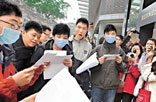Peninsula's breakthrough
Updated: 2012-03-02 08:07
(China Daily)
|
|||||||||||
That the Democratic People's Republic of Korea (DPRK) has agreed to suspend nuclear tests, long-range missile launches, and uranium enrichment activities in return for, among others, acquiring food aid from the United States has been hailed by the international community as significant progress in the process of realizing the peaceful denuclearization of the Korean Peninsula.
Wednesday's announcement came after representatives from the DPRK and the US met in Beijing on Feb 23-24 for the third round of high-level talks. The two sides had previously met in New York in July and in Geneva in October.
The DPRK has also agreed to the return of UN nuclear inspectors - which it expelled from the country in 2009 - to verify and monitor the moratorium on uranium enrichment.
The sudden death of DPRK leader Kim Jong-il added additional uncertainties to the already volatile situation on the Korean Peninsula, where tensions were already high following the shelling of Yeonpyeong Island.
There had been much speculation about the DPRK's foreign policy under the new leadership of Kim Jong-un. But the DPRK has seized the opportunity to reduce tensions on the Korean Peninsula and there now seem to be much brighter prospects for peace on the peninsula.
The agreement is an important step forward, and one that signals not only the consolidation of the new leadership, but also its policy flexibility.
But despite the consensus reached by Pyongyang and Washington that it is in their mutual interest to improve bilateral relations and push ahead with denuclearization through dialogue and negotiations, more mutual trust needs to be built up between the two countries.
Though the US, during the talks in Beijing last week, reaffirmed that it does not hold any hostile intent toward the DPRK, its insistence on frequent and large-scale joint military exercises with the Republic of Korea in the region will only aggravate Pyongyang's concerns over its national security.
With the commitment to denuclearization already there, it is time for the relevant parties to revive the long-stalled Six-Party Talks, which is the only effective mechanism for a long-term peaceful solution.
China welcomes the improved relations between the DPRK and the US, and is willing to play a constructive role in advancing the Six-Party Talks, so as to achieve lasting peace and stability on the Korean Peninsula and in Northeast Asia.
(China Daily 03/02/2012 page8)




